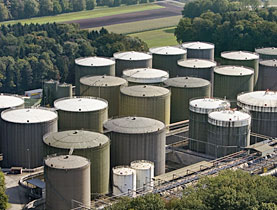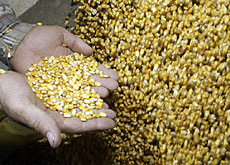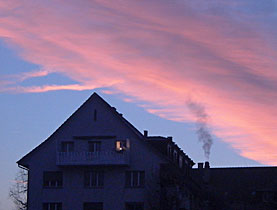Peak oil adds fuel to Swiss energy debate

Switzerland, which is "above average" when it comes to oil dependence, is not doing enough to prepare for shortages. This is the key finding of a new report.
The Swiss Academy of Engineering Sciences (SATW) said on Thursday that oil covered 57 per cent of the country’s total energy needs.
The independent umbrella organisation, which brings together experts, institutions and private companies, said Switzerland had to be ready for supply shortages.
One must assume that the maximum global extraction of petroleum – “peak oil” as it has come to be known – will be reached 20 years from now, according to the authors of the SATW report, “Oil shortages and mobility in Switzerland”.
“A complete replacement for petrol and diesel is not to be expected in the foreseeable future,” they warn.
The problem is exacerbated in Switzerland by the country’s strong demand. SATW says Swiss cars and trucks consume more fuel on average than other European nations.
“The Swiss are rich. We can afford modern cars which are energy efficient but they are also bigger,” co-author Ernst Reinhardt told swissinfo. “We and the Swedes are at the top of the European rankings.”
Reinhardt said voluntary measures and incentives so far had little impact, and he called on Switzerland to adapt legislation similar to a proposal made by the European Union to improve fuel economy.
EU plan
The goal of the EU plan is to reduce the average carbon dioxide emissions from new passenger cars from around 160 grams per kilometre to 130 grams per kilometre in 2012.
“Switzerland stands at around 170 grams but a reasonable target – if we take sustainable development into account – is at least 120,” Reinhardt said. “That amounts to about five litres of petrol for 100 kilometres.”
The SATW says only by taking government-led action like this can Switzerland achieve its goal of strongly reducing its oil dependency.
The organisation calls for quick and concerted action so Switzerland does not have to wait several years before seeing the results.
“A binding target should be a two per cent per year petrol and diesel reduction instead of higher consumption,” the report says, adding that biofuels are not the answer. One among them, ethanol, is controversial because it is made from crops and therefore poses a threat to food production.
Switzerland would not be severely affected by an oil supply crisis lasting less than 100 days. In this scenario, the country’s excellent public transport network would partly compensate and the Swiss would reduce unessential car trips in their free time.
Consequences
The authors say it is difficult to predict the consequences for Switzerland of a crisis lasting several years or even decades.
But the country is in a much better position to replace heating oil entirely with alternative methods to control the climate in houses and buildings.
“It is already possible today to heat buildings without oil or gas,” the report says.
While the SATW admonishes Switzerland for being slow to act, multinational oil companies are not. The authors say they are already preparing for the time after peak oil.
And many oil-producing countries, including the United States, Norway and Indonesia, are already beyond their maximum capacity, it says.
The SATW wants to initiate a public debate on the peak oil issue at a symposium it is organising for August 29-30 in Yverdons-les-Bains.
Reinhardt says consumer attitude is at the heart of the problem, since the Swiss buy what they can afford, regardless of the environmental consequences.
“This is why the government has to step in, and this might be necessary when we consider the ever-increasing global competition for scarce resources.”
swissinfo, Dale Bechtel
Peak oil is the point in time when the maximum rate of global petroleum extraction is reached, after which the rate of production starts an irrevocable decline.
The fact that oil production will peak is not disputed. The exact timing of the peak, however, is hard to say because Opec countries are not open about the size of their oil reserves. Estimates range from thinking it has already happened, possibly around 2005, to far enough in the future to allow alternatives to be found.
The problems, which will start when oil supply cannot meet the world’s energy demand and no alternative energy source can fill the gap, include increasing “resource wars”, fewer investments and purchases, and economic slowdown or recession.
Higher fuel costs – and connected higher food costs – will lead to inflation and unemployment, not to mention acute food shortages.
Transport costs will go up, leading to a possible “reversion” of globalisation and the regionalisation of trade, arguably harming economic prosperity and opportunity in developing nations.

In compliance with the JTI standards
More: SWI swissinfo.ch certified by the Journalism Trust Initiative




You can find an overview of ongoing debates with our journalists here . Please join us!
If you want to start a conversation about a topic raised in this article or want to report factual errors, email us at english@swissinfo.ch.